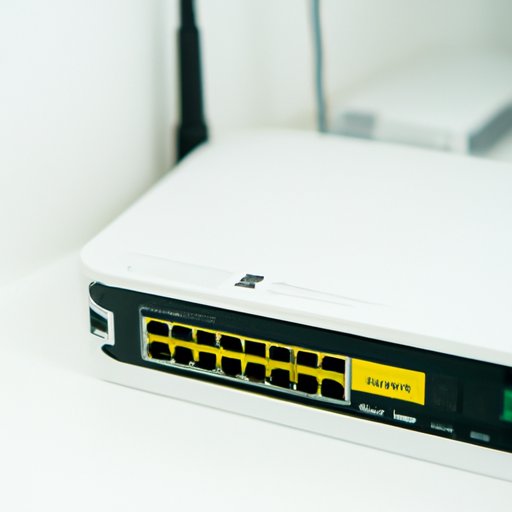
Introduction
If you’re setting up a home internet connection or upgrading your existing one, you might come across some confusion on whether you need a modem or router or both. In this article, we’ll provide a comprehensive guide to help you understand the difference and determine if you need both devices or just one.
The Ultimate Guide to Understanding Modems and Routers: Do You Need Both?
First things first, let’s discuss what a modem and router are and their functions.
A modem is a hardware device that connects your home internet network to the internet service provider (ISP) using a wired or wireless connection. It receives signals from the ISP and converts them into a format that a computer or other devices can understand to access the internet.
On the other hand, a router, also a hardware device, connects multiple devices to the same internet connection. It forwards the information between devices, allowing them to communicate with each other and access the internet simultaneously.
Both the modem and router work together to provide internet access to all your devices such as smartphones, laptops, tablets, and smart home devices.
Having both a modem and a router is essential for a reliable home network. If you’re using just a modem, you can connect only one device directly to the internet. With a router, you can connect multiple devices without the need for extra connections or equipment.
Single Device or Combo Unit? Figuring out What Your Internet Connection Needs
Now, let’s discuss whether you need to purchase a single modem-router combo unit or separate modem and router devices.
A single device, a modem-router combo unit, combines both functions into one piece of hardware. It is highly recommended for people who want an affordable, simple setup process, and have limited space. Moreover, a combo unit is easier to manage, as all the features and settings come in a single interface.
However, if you opt for separate modem and router devices, you can replace them independently, upgrade one of the two devices, and customize your setup more thoroughly. In exchange for this flexibility, you’ll need to invest more money and time in setup, since two different devices need to be configured. You’ll also need to know to troubleshoot when either of those devices fails.
Therefore, you need to consider a few factors to decide which option works best for you. If you have a spacious home and want to tweak your network settings to suit your needs, a separate modem and router device would likely be your best bet. But, if you prefer a simple setup, have limited space, and fewer devices, a combo device is a great option.
Modem vs. Router: Which One is Essential For Your Home Network?
It’s essential to discuss the differences between the two devices to understand why having both is necessary for a home network considering they serve different functions.
A modem is the cornerstone of an internet connection, since it connects your network to the internet. It receives an internet signal from your provider and transmits it to your devices. To put it plainly, a modem is necessary if you want to be online.
On the other hand, the router is responsible for managing your home network’s internet traffic and security. The router connects to the modem and then broadcasts that internet connection for each of your devices.
Without a router, your devices would be exposed to the internet without any protection, leaving you vulnerable to network attacks, hacking attempts, and viruses. Additionally, the router provides advanced features such as bandwidth control, parental controls and Quality of Service (QoS) settings to improve your online experience.
Setting Up Your Home Internet: The Pros and Cons of Having a Modem and Router Separately
If you have decided to purchase a separate modem and router device, follow these simple steps to set up your home internet:
- Plug the modem into a power source and your ISP’s connector port.
- Attach the modem to your router, then connect the router to a power source.
- Finally, configure the router’s settings in the interface using the instruction manual.
The benefit of having a separate modem and router is that you can configure and customize each device independently and replace them separately, which adds flexibility to manage your network. However, setting them up separately requires more money and time, with an increased need for technical know-how required in setting them up and troubleshooting.
Demystifying Home Networking: Do You Need Both a Modem and Router or Just One?
Considering all points discussed, it is clear that having both modem and router devices is essential for a reliable home network. By having both, you can manage your network traffic and security effectively while having the necessary flexibility and customization that separate devices offer.
However, if you’re on a tight budget or have limited space, a modem-router combo unit is a suitable option too. It offers basic features and is easier to manage since requiring only a single device, but at the cost of flexibility.
Conclusion
In conclusion, understanding the difference between a modem and router is a critical factor when setting up a reliable and secure home network. By having both a modem and a router, you can provide stable internet connection, manage internet traffic and ensure network security from cyber-attacks efficiently. So, investing in these devices increases your online experience.
Don’t wait until something goes wrong. Invest in a reliable modem and router to safeguard your digital life by a stable internet connection and smoother online experience.




